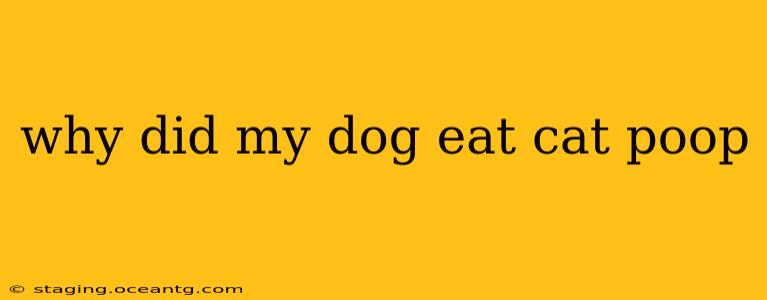Coprophagia, the eating of feces, is a surprisingly common behavior in dogs, and while it's often disgusting to us, understanding the underlying reasons can help address the issue. It's crucial to remember that this isn't just about a messy habit; it could indicate an underlying medical or nutritional problem. This guide will explore the various reasons why your dog might be indulging in this unsavory behavior, offering solutions and advice on how to prevent it.
Why Do Dogs Eat Cat Poop Specifically?
Dogs might target cat poop for several reasons, often intertwined with the broader reasons for coprophagia. The scent and taste might be appealing, particularly if the cat food is high in protein or fat. In some cases, a dog might simply be scavenging for resources if they feel they aren't getting enough nutrition in their own food.
What Are the Common Reasons for Coprophagia in Dogs?
Nutritional Deficiencies: This is a primary reason. If your dog's diet is lacking in certain nutrients, they might seek them out in other sources, including feces. This is especially true for protein and fat. A high-quality, balanced dog food can usually resolve this.
Pancreatic Insufficiency: This condition affects the pancreas's ability to produce digestive enzymes, leading to undigested food in the stool. The undigested food may appear more appealing to your dog. Veterinary diagnosis and treatment are essential in this case.
Intestinal Parasites: Parasites can cause malabsorption and digestive upsets, leading to less-digested stool that might be more attractive to your dog. Regular deworming is crucial.
Boredom and Attention Seeking: Sometimes, dogs eat poop simply to get a reaction from their owners. The negative attention is still attention, and they may repeat the behavior if it gets a response.
Stress and Anxiety: Just like humans, dogs can exhibit unusual behaviors under stress. Coprophagia can be a manifestation of underlying anxiety or stress.
Is it Dangerous for My Dog to Eat Cat Poop?
While the act itself is unpleasant, the bigger concern lies in the potential for disease transmission. Cat feces can contain parasites like Toxoplasma gondii (responsible for toxoplasmosis) that can cause serious health issues in dogs (though usually less severe than in humans and cats). There's also a risk of bacterial infections.
How Can I Stop My Dog From Eating Cat Poop?
- Dietary Changes: Consult your veterinarian about adjusting your dog's diet to ensure it's meeting all nutritional needs. They might recommend a higher-quality food.
- Veterinary Check-up: Rule out underlying medical conditions like pancreatic insufficiency or intestinal parasites.
- Environmental Modifications: Make sure your cat's litter box is inaccessible to your dog. Consider using covered litter boxes or placing them in areas your dog can't reach.
- Enzyme Supplements: These can help improve digestion and reduce the amount of undigested food in the stool.
- Training and Positive Reinforcement: Reward your dog for good behavior when they're not eating cat poop. Make the behavior undesirable by using a firm "No!" or other deterrents.
- Address Stress and Anxiety: If stress is a factor, consider providing more enrichment activities, such as puzzle toys, increased exercise, and training sessions.
What If My Dog Already Ate Cat Poop?
If your dog has already eaten cat poop, monitor them closely for any signs of illness, such as vomiting, diarrhea, lethargy, or changes in appetite. Consult your veterinarian if you notice any of these symptoms.
By addressing the underlying cause of coprophagia and implementing appropriate preventative measures, you can help break this habit and ensure your dog's health and well-being. Remember to consult your veterinarian for personalized advice and to rule out any medical issues.
